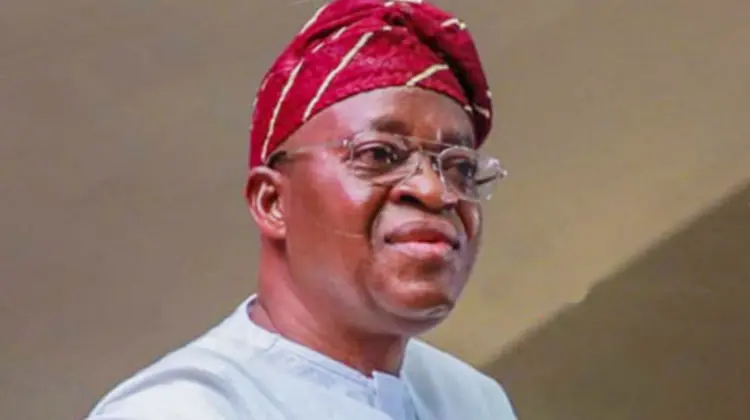There was mild drama in the House of Representatives on Monday as the Minister of Blue and Marine Economy, Gboyega Oyetola, claimed that a multi-billion-dollar cargo tracking agreement entered into by the federal government regarding the International Cargo Tracking Notes, ICTN was faulty.
The minister made this claim while facing questioning by a House investigative panel looking into the delay in implementing the cargo tracking project, which experts say is costing the country $500 million monthly.

The hearing, organised by the House of Representatives Committee on Shipping Exercises, Customs, Port and Harbour, and Maritime Safety, Education, and Administration, is probing the non-implementation of the contract.
Mr Oyetola, who was represented by Babatunde Sule, a director in the Ministry of Blue and Marine Economy, justified the delay, stating that the process approved by the Federal Executive Council, FEC, was flawed.
In March 2023, the administration of former President Muhammadu Buhari engaged a consortium led by Antaser Nigeria Limited to implement a cargo tracking system for all imports and exports, including crude oil exports.
However, with the change of government, Sahara Reporters learned that some officials of the Bola Tinubu administration are attempting to replace the Antaser-led consortium with their own preferred investors, in the guise of a PPP arrangement using the new DG of ICRC, Jobson Ewaleifoh.
In July, the federal government announced the award of a contract to procure advanced solution technology for the Nigerian oil and gas sector. The Minister of State for Petroleum, Heineken Lokpobiri, announced the deal at a press briefing, stating it would enable the country to track every cargo of crude oil loaded in Nigeria to its destination.
The minister’s representative, who had earlier acknowledged the project’s approval by the FEC, later claimed it was done in error.
“The process was even faulty ab initio. The process that led to this was wrong,” he said, as the lawmakers jeered at his comments.
“The process could have been better than the way it was handled,” Mr Sule added after some of his colleagues whispered to him.
Earlier, he had said, “I am aware of the contract. I am also aware that it was given to five companies. I learned that four of the companies signed an agreement, with the fifth not signing, and I think that was what stalled this whole process.”
Many lawmakers were unimpressed by the representative’s responses, with some questioning his capacity to represent the minister adequately.
“I don’t think you are capable enough to represent the minister; you don’t even have any information about the issue. The ministry is not serious. The minister did not show up, the permanent secretary did not show up, and you who are here do not have first-hand information,” Kabir Maipalace, a committee member, said.
Mr Ewaleifoh had during the hearing insisted that he was only aware of the flawed procurement process initiated by former minister of transport, Rotimi Amaechi.
Reacting to this, Frank Tietie, the director of Citizens Advocacy for Social Justice in Nigeria (CASER) reminded the DG that it was discovered that those companies ICRC were trying to procure namely Medtech Scientific Limited, Rozi International Ltd and Frabemar UK were in medical equipment and construction businesses, and the government had quickly cancelled that process midway after the unprecedented outcry from NGO’s and industry stakeholders before commencing and awarding to the Antaser Nigeria Ltd led consortium.
In its presentation, Antaser’s chairman, Emeka Obianozie, informed the committee about how his company received approval to implement the project, including approval by the Federal Executive Council.
He stated that under the current administration, the Nigerian Upstream Petroleum Regulatory Commission, NUPRC and the Nigerian Customs Service, NCS are attempting to build and implement the same service in the oil and gas sector at a greater cost.







